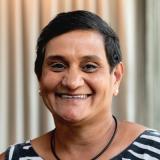Members of the 2021–2024 Research Committee of the National Health and Medical Research Council (NHMRC) are appointed until 30 June 2024.
Committee members

Professor
Anushka
Patel
Chair
Member with expertise in clinical medicine/ science
Member-in-Common with Health Research Impact Committee
Professor Anushka Patel is the Vice-Principal Director and Chief Scientist at The George Institute for Global Health, Professor of Medicine at UNSW Sydney, and Cardiologist at Central Sydney Cardiology and Royal Prince Alfred Hospital in Sydney.
Professor Patel's research focuses on understanding and improving cardiovascular disease management in global populations. She currently leads research projects focusing on developing innovative solutions for delivering affordable and effective cardiovascular care in the community and in acute care hospital settings with partners in a number of countries including Australia, China, Indonesia and India.
Professor Patel has served as a member of the NHMRC Research Committee since 2018. She is supported by a Principal Research Fellowship from the NHMRC.
Declaration
- Director, George Institute for Global Health (India)
- Provision of fee for service and gratis consultancies on behalf of self and institutional affiliations
- Receipt of honoraria for academic activities on behalf of institutional affiliations
- Recipient of, and likely future applicant to, NHMRC for research funding, including salary support for self and/or team
- Institutional affiliations as noted in profile.

Professor
Adrian
Barnett
Member with expertise in multidisciplinary research
Professor Adrian Barnett is a Professor of Statistics at Australian Centre for Health Services Innovation and Centre for Healthcare Transformation, Queensland University of Technology. He is the past President of the Statistical Society of Australia.
Professor Barnett’s research interests include meta-research, research funding and reducing research waste. He works on improving statistical practice and increasing research quality to increase the value of health and medical research.
He is a board member of the Association for Interdisciplinary Meta-research & Open Science, and the Mathematical Sciences Cluster representative on the board of Science and Technology Australia. He is a fellow of the Academy of the Social Sciences in Australia.
Declaration
- Board Membership: Science and Technology Australia; Association for Interdisciplinary Meta-research and Open Science
- Recipient of, and likely future applicant to, NHMRC for research funding, including salary support for self and/or team
- Past and ongoing research of peer review and ethical review processes
- Institutional affiliations as noted in profile.

Professor
Tony
Capon
Member with expertise in Public Health
Professor Tony Capon is Director of the Monash Sustainable Development Institute (MSDI) and Professor of Planetary Health in the School of Public Health and Preventive Medicine at Monash University.
A public health physician and authority in environmental health and health promotion, his research focuses on urbanisation, sustainable development and human health. Professor Capon is a former director of the International Institute for Global Health at United Nations University (UNU-IIGH), has previously held professorial appointments at the University of Sydney and Australian National University. He is a Foundation Fellow of the Australasian Faculty of Public Health Medicine in the Royal Australasian College of Physicians.
Professor Capon co-chairs the Future Earth Health Knowledge-Action Network and is a member of the Rockefeller Foundation–Lancet Commission on Planetary Health and the International Advisory Board for The Lancet Planetary Health.
Declaration
- Advisory Board: WHO Climate Change and Environment and Health Technical Advisory Group, Western Pacific Region and The Lancet Planetary Health
- Recipient of, and likely future applicant to, NHMRC for research funding, including salary support for self and/or team
- Institutional affiliations as noted in profile.

Professor
Raymond
Chan
Member with expertise in clinical medicine/ science
Professor Raymond Chan is the Director and Professor of Cancer Nursing, Caring Futures Institute, Flinders University.
Professor Chan's program of research focuses on optimising models of care and outcomes for cancer survivors.
Professor Chan currently serves as Chair for the Survivorship Group of the Clinical Oncology Society of Australia. He also serves as Chair for the Survivorship Study Group within the Multinational Association for Supportive Care in Cancer and as a Board Director for the International Society of Nurses in Cancer Care.
In March 2021, Professor Chan was inducted to the Sigma International Nurse Researcher Hall of Fame.
Declaration
- Directorships: International Society of Nurses in Cancer Care and Flinders Caring Futures Institute, Flinders University.
- Institutional affiliations as noted in profile.

Dr
Yee Lian
Chew
Member with expertise in basic science
Dr Yee Lian Chew is the Mary Overton Senior Research Fellow at the Flinders Health and Medical Research Institute at Flinders University in Adelaide.
Dr Chew’s research seeks to understand the chemical signals in the brain that trigger learning and experience-dependent behaviours. Using a combination of genetic tools, advanced imaging and behavioural assays in order to dissect pathways of neuronal communication important not only for learning, but also relevant to human disorders such as pain and neurodegenerative disease.
Dr Chew is part of the 2021–2022 cohort of Superstars of STEM, a program run by Science & Technology Australia to promote the profile of women STEM professionals. She was awarded the University of Wollongong Vice Chancellor's Emerging Researcher of the Year Award in 2020.
Dr Chew aims to promote equity, diversity and inclusion in academia by removing barriers to retention for minoritised groups. She is a member of the EMCR (Early- and Mid-Career Researcher) Forum Executive, supported by the Australian Academy of Science, and the 2021 Chair.
Declaration
- Board Member: EMCR Forum Executive Committee, Australian Academy of Science (Chair 2021)
- Recipient of, and likely future applicant to, NHMRC for research funding, including salary support for self and/or team
- Institutional affiliations as noted in profile.

Ms
Christine
Gunson
Member with expertise in consumer issues
Ms Christine Gunson has over 30 years professional experience as an human resource adviser at senior levels across the mining, manufacturing and higher education sectors. Since 2000 until her recent retirement, Ms Gunson held the position of Manager of Strategic Human Resources for Edith Cowan University with a focus on workforce planning, workforce metrics and performance measurement reporting and development.
From 2009 Ms Gunson worked on a select number of health sector strategic consultancy projects with Dr Norman Swan, which provided insight into the sector and its challenges as it responded to state and Commonwealth reform agendas. Subsequently she was approached to be involved in consumer representation related in particular to government initiatives around hospital performance measurement, reporting and accountability. This involved two years with the National Hospital Performance Authority on two consecutive advisory groups.
From 2018 to 2021 Ms Gunson was a member of both the NHMRC's Research Committee and Consumer and Community Advisory Group. Since 2016 she has served as the consumer representative on a number of NHMRC Peer Review panels and 'Relative to Opportunity' working parties. She was also a member and consumer representative for Consumer Health Forum Australia and served as a member of their Research and Data special interest group.
Declaration
- Institutional affiliations as noted in profile.

Professor
Glenda
Halliday
AC
Member with expertise in clinical medicine/ science
Professor Glenda Halliday is a Professor of Neuroscience and a NHMRC Senior Leadership Fellow at the University of Sydney.
Professor Halliday is an Australian career neuroscientist and research neuropathologist specializing in neurodegeneration. She has worked with many Australian and international researchers on important scientific questions on Parkinson's disease, alcohol toxicity, dementia with Lewy bodies, frontotemporal dementias and motor neurodegenerative diseases. As an international leader in neurodegeneration, her research has directly influenced clinical practice by providing the evidence base for understanding the pathologies underlying neurodegenerative diseases, clarifying the trajectory of these diseases over time and exploring any potential variability.
Professor Halliday was the Past President of the Australian Neuroscience Society and is a committee member for a number of organizations, including the Viertal Foundation Medical Advisory Board. She was appointed to the Academy of the National Health and Medical Research Council of Australia in 2008. Professor Halliday was awarded the NHMRC Elizabeth Blackburn Investigator Award–for leadership in Clinical Medicine and Science in 2020 and elected as a Fellow of the Australian Academy of Science in 2021.
Declaration
- Director, Vision Perfection Pty LTD
- Unpaid board and scientific advisory board work: Various academic and philanthropic organisations; various Editorial Boards
- Recipient of, and likely future applicant to, NHMRC for research funding, including salary support for self and/or team
- Institutional affiliations as noted in profile.

Professor
Doug
Hilton
AO
Member with expertise in basic science
Professor Doug Hilton is the 6th Director of the Walter and Eliza Hall Institute, Head of the Department of Medical Biology in the Faculty of Medicine, Dentistry and Health Sciences at the University of Melbourne, and the immediate past President of the Association of Australian Medical Research Institutes.
Professor Hilton is a biologist investigating blood cell production and function, and how cells communicate with each other. The goal of his research is to improve the prevention, diagnosis and treatment of blood and immune disorders such as blood cancers, arthritis and asthma. He is best known for his discoveries in the area of cytokine signalling, his advocacy for health & medical research and for gender equity in science.
The Hilton laboratory aims to understand which of the 30,000 genes are important in the production and function of blood cells, and how this information can be used to better prevent, diagnose and treat blood cell diseases such as leukaemia, arthritis and asthma. He is an inventor of more than 20 patent families, most of which have been licensed, and is a co-founder of the biotechnology company MuriGen.
Professor Hilton has served as a member of the NHMRC Research Committee since 2018. He was awarded an Officer of the Order of Australia in 2016 for distinguished service to medical research and education, particularly in the field of haematology, as a molecular biologist and author, to gender equity, and as a mentor of young scientists. Professor Hilton is a Fellow of the Australian Academy of Science, of Technological Sciences and Engineering, and of Health and Medical Sciences and the inaugural recipient of The Lorenzo and Pamela Galli Chair in Medical Biology.
Declaration
- Unpaid board and scientific advisory board work: Various academic and philanthropic organisations
- Paid Scientific Advisory Board Member of Hermon Slade Foundation
- Recipient of, and likely future applicant to, NHMRC for research funding, including salary support for self and/or team
- Institutional affiliations as noted in profile.

Professor
Frances
Kay-Lambkin
Member with expertise in clinical medicine/science
Member-in-Common with Women in Health Science Committee
Professor Frances Kay-Lambkin commenced as Institute Director of the Hunter Medical Research Institute in May 2022. Prior to this she was an NHMRC Leadership Fellow at the School of Medicine and Public Health, College of Health and Wellbeing, at The University of Newcastle. She is a registered Psychologist and has previously held a number of concurrent leadership roles including interim Pro Vice-Chancellor of Research and Innovation at the University of Newcastle and Director for Technology and Translation at the NHMRC Centre for Research Excellence. She also served as the University of Newcastle's COVID-19 Response Lead throughout 2021.
Professor Kay-Lambkin’s research program has been instrumental in demonstrating the transformative impact of digital technologies in bringing integrated treatments to the point of care for people with mental health and substance use problems. Over the past 15 years she has worked in a clinical research capacity with people experiencing a range of mental health and alcohol and other drug use problems, including: psychotic disorders, depression, personality disorders and anxiety.
Professor Kay-Lambkin has received national and international recognition for her work to improve mental health and addiction outcomes, including recognition though NHMRC's 2018 Ten of the Best Research Projects for her work '[Treating binge drinking and depression in young people via the internet' and the international Fred Yates Award for significant contributions to addiction research.
Declaration
- Board Positions
- Board Director, Orygen: the National Centre for Excellence in Youth Mental Health (2019-present).
- Honorary Appointments and Affiliations
- Foundation Member, National Mental Health Think Tank, Australia (2020–present).
- Honorary Professor, Matilda Centre, University of Sydney (2019–present).
- President, Executive Committee, Society for Mental Health Research (2017–present).
- Visiting Professor, Black Dog Institute, University of NSW (2016–present).
- Expert Advisory Groups and Committees
- Member, Independent Evaluation Advisory Committee, beyondblue (2021–present).
- Member, Prevention and Early Intervention Working Group, Centre for Alcohol and Other Drugs, NSW Ministry of Health (2020–present).
- Chair, eMental Health Clinical Specialist Advisory Committee, Paramatta Mission and Penrith Headspace (2020–present).
- Member, Expert Advisory Panel, Million Minds Mission, Medical Research Futures Fund (2018–present).
- Member, Expert Advisory Panel, National Mental Health Research Strategy, National Mental Health Commission (2019–present).
- Member, National Eating Disorders Research & Translation Advisory Committee, National Eating Disorders Strategy (2019–present).
- Chair, Research Strategy Committee, Orygen, the National Centre for Excellence in Youth Mental Health (2019–present).
- Chair, Research Committee, The Black Dog Institute, University of New South Wales (2017–present).
- Member, Advisory Group, International Alliance of Mental Health Research Funders (2019–present).
- Recipient of, and likely future applicant to, NHMRC for research funding, including salary support for self and/or team
- Institutional affiliations as noted in profile.

Professor
Sarah
Larkins
Member with expertise in Health Services Research
Professor Sarah Larkins is the Dean and Professor of Health Systems Strengthening, College of Medicine and Dentistry and Director of Research Development in the Division of Tropical Health and Medicine, at James Cook University.
Professor Larkins has particular skills and experience in Aboriginal and Torres Strait Islander health research and health services and workforce research and is an internationally recognised expert in social accountability in health professional education.
She is also Co-Director of the Anton Breinl Research Centre for Health Systems Strengthening, a centre of the Australian Institute of Tropical Health and Medicine. Professor Larkins' particular focus is on collaborating to improve equity in health care services for underserved populations, particularly rural, remote, Indigenous and tropical populations, and on training a health workforce with appropriate knowledge, attitudes and skills for this purpose
She currently serves as the Convenor, Clinical Leadership Group for the NHMRC-recognised Tropical Australian Academic Health Centre, and Co-Chair of the Primary and Chronic Care Panel and Guideline Leadership Group Member of the Living Evidence Guidelines for COVID-19.
Declaration
- Board Member: NHMRC-recognised Tropical Australian Academic Health Centre, Primary and Chronic Care Panel and Living Evidence Guidelines for COVID-19.
- Recipient of, and likely future applicant to, NHMRC for research funding, including salary support for team and in the past a PhD stipend for self.
- Institutional affiliations as noted in profile.

Professor
Fabienne
Mackay
Member with expertise in basic science
Professor Fabienne Mackay is the 8th Director and Chief Executive Officer of QIMR Berghofer Medical Research Institute in Queensland.
A molecular biology and immunology expert, in 2015, she became the inaugural Head of the School of Biomedical Sciences and Head of the Department of Pathology in the Faculty of Medicine, Dentistry and Health Sciences, at the University of Melbourne, Australia.
Professor Mackay's laboratory discovered the role of a very important factor, named BAFF, in health but also in autoimmune diseases, findings described in very highly cited articles and providing the knowledge foundation for the development of a novel therapy called belimumab (BenlystaTM), and now approved for the treatment of patients with Systemic Lupus Erythematosus (SLE) and the first new treatment for SLE in over 50 years.
She received the Thomson Reuters Australia Citation and Innovation award and a trophy from the French Ministry of Foreign Affairs in Paris for outstanding contribution in education and research as an expatriate. She also received the Martin Lackmann award for translational research and the William A. Paul Distinguished Innovator award from the Lupus Research Alliance (USA). She is elected fellow of the Australian Academy of Health and Medical Sciences, and a member of Council for the Academy.
Declaration
- Board Member: Council of the Queensland Institute of Medical Research (QIMR Berghofer); Council of the Australian Academy of Health and Medical Sciences; Association of Australian Medical Research Institutes; Health Translation Queensland
- Recipient of, and likely future applicant to, NHMRC for research funding, including salary support for self and/or team
- Institutional affiliations as noted in profile.

Professor
James
McCluskey
AO
Member with expertise in basic science and clinical medicine
Professor James McCluskey is the Deputy Vice-Chancellor (Research) and Redmond Barry Distinguished Professor in Microbiology and Immunology at The University of Melbourne.
Professor McCluskey trained as a physician then carried out immunology research at the National Institutes of Health (USA). He has held senior positions at Monash University, Flinders University and the Australian Red Cross Blood Service in Adelaide, South Australia.
Professor McCluskey established the SA unrelated bone marrow donor registry. He led the development, funding and establishment of the Peter Doherty Institute for Infection and Immunity and is a founding member of Australian Friends of ASHA Slums (the Australian branch of Asha India). He led a team that helped to establish a new fellowship program focused on leadership to effect social change.
Professor McCluskey has served as a member of the NHMRC Research Committee since 2018. He was awarded an Officer of the Order of Australia in 2018 for distinguished service to medical education, as an academic in immunology, and through research into immune systems response to viruses.
Declaration
- Board Member Directorships: Victorian Comprehensive Cancer Centre, WEHI, Trinity College Melbourne, Nossal Institute Ltd (Chair).
- Governing Council Member: Peter Doherty Institute for Infection & Immunity, Atlantic Fellows for Social Equity (AFSE) and Atlantic Institute (Oxford).
- Recipient NHMRC Investigator Award. Recipient NIH Grant. Past recipient NHMRC Program and Project Grants. Salary support for research team only.
- Member WEHI, Florey Institute of Neuroscience

Professor
David
Preen
Member with expertise in Public Health
Member-in-Common with Australian Health Ethics Committee
Professor David Preen is the Chair in Public Health at the University of Western Australia’s School of Population and Global Health. He holds an honorary position at Swansea University, United Kingdom.
Professor Preen has been involved with conducting public health and health services research using population-based linked data for over 15 years to study areas including cancer service delivery, pharmaco-epidemiology, chronic disease management, health of marginalised populations, and methodological advances using data linkage.
He has an established national and international reputation as a leading linked data researcher working at the evidence/ policy/ practice interface to improve community health and healthcare policy. His research program, combined with a strong evidence policy translation focus, is working to improve health, social and economic outcomes for vulnerable populations.
He is the University of Western Australia's Node Director for the NHMRC Centre of Research Excellence in Medicines Intelligence.
His work has been recognised through the Peter Reizenstein Prize from the International Journal of Quality in Health Care and the Editor’s Choice Award from the Medical Journal of Australia. He has been a member of the NHMRC Assigners Academy and has been an associate editor or editorial board member for multiple international journals.
Declaration
- Director: NSW Sax Institute
- Chair: Australian National Child Health and Development Atlas (ANCHDA) – National Oversight Committee
- Chair: Cancer Council Western Australia – Research Committee
- Member: Longitudinal Study of Australian Children (LSAC) Consortium Advisory Committee
- Member: ALIVE National Centre for Mental Health Executive Committee
- Provision of fee for service and pro bono consultancies on behalf of institutional affiliations and self
- Recipient of, and likely future applicant to, NHMRC for research funding, including salary support for self and/or team
- Institutional employment as noted in profile.

Professor
Yvette
Roe
Member with expertise in the health needs of Aboriginal persons and Torres Strait Islander people
Member-in-Common with Principal Committee Indigenous Caucus
Professor Yvette Roe is a proud Njikena Jawuru woman who has dedicated over 30 years working with, and for, First Nations people. She is a leading First Nations researcher and undertakes research that is co-designed with communities, and service providers, and aims to dismantle systemic structural inequities to improve health equity. She is the Professor in Indigenous Health and Co-director of the Molly Wardaguga Research Centre, at the Charles Darwin University in Darwin.
Her research is focused on ensuring maternal and infant services are informed by an Indigenous epistemology and ontology and mother-child focused. It is co-designed with families, communities, and service providers, and aims to improve health for First Nations Australians, with a specific focus on the first 2000 days.
Professor Roe has a proven record of engaging with researchers and stakeholders in CI and AI roles of numerous grants. Professor Roe has established a research team to support her work and uses methodologies to privilege First Nations knowledges that is co-designed with communities and service providers. Professor Roe has collaborative projects across Australia, Canada, and Aotearoa.
In 2018–2021 Professor Roe was a member of both the NHMRC’s Research Committee and Principal Committee Indigenous Caucus (PCIC). She has served as a member of PCIC since 2015 and has significantly contributed to NHMRC’s work for improving Aboriginal and Torres Strait Islander health through research.
Declaration
- Recipient of, and likely future applicant to, NHMRC for research funding, including salary support for self and/or team
- Institutional affiliations as noted in profile.

Associate Professor
Joshua
Vogel
Member with expertise in Public Health Research
Associate Professor Vogel is a perinatal epidemiologist and a Principal Research Fellow at the Maternal, Child and Adolescent Health Program at the Burnet Institute, Melbourne, where he co-heads the Global Women's and Newborn's Health team.
Associate Professor Vogel's research focuses on maternal and perinatal health issues affecting women and families living in resource-constrained settings. His areas of professional interest are interventional trials, clinical epidemiology and guideline development.
He is an NHMRC Emerging Leadership Fellow and was recognised with the 2020 NHMRC Peter Doherty Investigator Grant Award and the Commonwealth Health Minister's Award for Excellence in Health and Medical Research. He holds honorary appointments at the University of Melbourne, Monash University and Deakin University.
Declaration
- Recipient of, and likely future applicant to, NHMRC for research funding, including salary support for self and/or team
- Institutional affiliations as noted in profile.